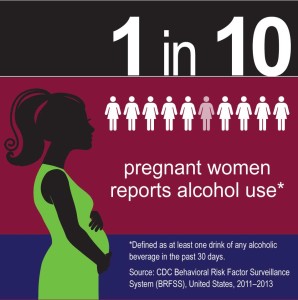WASHINGTON — Women have been warned for years about the risks of drinking alcohol during pregnancy. But it seems that some are ignoring the message.
The Centers for Disease Control and Prevention is out with new statistics that show that one in 10 pregnant women in the United States between the ages of 18 and 44 admit to drinking alcohol in the past 30 days. Even more worrisome is the fact that one-third of these woman are binge drinkers.

The CDC based its numbers on a landline and cellphone survey of women across the country. The results show that among expectant moms, alcohol use is the highest among those who are 35-44 years old. Also, there is a higher level of drinking among college graduates and single women.
The numbers are concerning because drinking during pregnancy can result in miscarriages and birth defects.
“Even in 2015, we don’t know if there is any safe level of alcohol for pregnant women,” says Dr. Michael Fingerhood, an addictions specialist and associate professor of medicine at Johns Hopkins University.
He says that is why experts say expectant moms should drink no alcohol at all.
The most dramatic cases of fetal alcohol syndrome occur in women who drink every day, but even an occasional glass of wine on the weekend can be risky for some.
“There can be more subtle structural brain abnormalities, there could be some neurodevelopmental disorders that may not even be apparent when the child is born,” Fingerhood says.
Some of the women who drink while pregnant may have problems with alcohol that make it difficult to give it up entirely and some, especially the binge drinkers, may be in denial about the potential risks. Others may simply rationalize drinking by saying just a glass once or twice a week will do no harm.
“A better message getting out there that any amount of alcohol is a risk is essential,” says Fingerhood.
One person who is trying hard to craft a better message is Kathy Mitchell, an addictions counselor who is vice president of the National Organization on Fetal Alcohol Syndrome.
For Mitchell, the issue is very personal.
“I didn’t get the message,” she says, noting she had five kids in the 1970s before she even heard of Fetal Alcohol Syndrome.
Mitchell came from a family of alcoholics, and drank on the weekends during her pregnancies. One daughter was born with severe Fetal Alcohol Syndrome. Two other babies died — one at birth and one at three months.
“You can imagine the passion I have for this issue,” she says
Decades after the births of her own children, Mitchell is trying to prevent other women from making the same mistake. She says the latest statistics from the CDC are worrisome, and she is concerned that the problem persists.
The CDC says it’s hard to say just how many Americans have what is technically known as Fetal Alcohol Spectrum Disorders. It says based on community studies, experts estimate that the full range in the United States and some Western European Countries is as high as two to five percent of all school-aged children.




